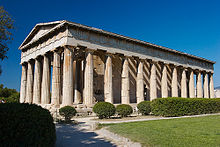Religion
Classical Greece
Classical Athens may be suggested to have heralded some of the same religious ideas that would later be promoted by Christianity, such as Aristotle's invocation of a perfect God, and Heraclitus' Logos. Plato considered there were rewards for the virtuous in the heavens and punishment for the wicked under the earth; the soul was valued more highly than the material body, and the material world was understood to be imperfect and not fully real (illustrated in Socrates's allegory of the cave).
Hellenistic Greece
Alexander's conquests spread classical concepts about the divine, the afterlife, and much else across the eastern Mediterranean area.Jews and early Christians alike adopted the name "hades" when writing about "sheol" in Greek. Greco-Buddhism was the culturalsyncretism between Hellenistic culture and Buddhism, which developed in the Indo-Greek Kingdoms. By the advent of Christianity, the four original patriarchates beyond Rome used Greek as their church language.
Modern Greece
The Greek Orthodox Church, largely because of the importance of Byzantium in Greek history, as well as its role in the revolution, is a major institution in modern Greece. Its roles in society and larger role in overarching Greek culture are very important; a number of Greeks attend Church at least once a month or more and the Orthodox Easter holiday holds special significance.
The Church of Greece also retains limited political influence through the fact the Greek constitution does not have an explicit separation of Church and State; a debate suggested by more conservative elements of the church in the early 2000s about identification cards and whether religious affiliation might be added to them highlights the friction between state and church on some issues; the proposal unsurprisingly was not accepted. A widely publicised set of corruption scandals in 2004 implicating a small group of senior churchmen also increased national debate on introducing a greater transparency to the church-state relationship.
Greek Orthodox Churches dot both the villages and towns of Greece and come in a variety of architectural forms, from older Byzantine churches, to more modern white brick churches, to newer cathedral-like structures with evident Byzantine influence. Greece (as well as Cyprus), also polled as, ostensibly, one of the most religious countries in Europe, according to Eurostat; however, while the church has wide respect as a moral and cultural institution, a contrast in religious belief with Protestant northern Europe is more obvious than one with Catholic Mediterranean Europe.
Greece also has a significant minority of Muslims in Eastern Thrace (numbering around 100-150,000), with their places of worship guaranteed since the 1923 Treaty of Lausanne. The Greek state has fully approved the construction a main mosque for the more recent Muslim community ofAthens under the freedom of religion provisions of the Greek constitution.


No comments:
Post a Comment